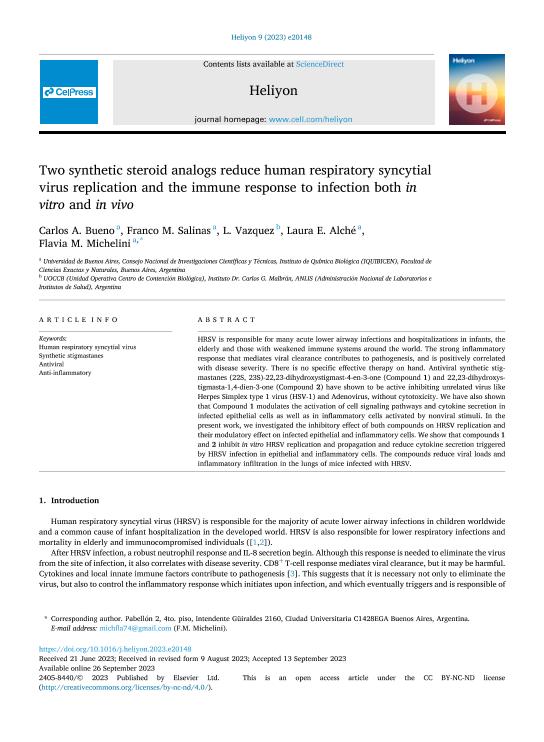Artículo
Two synthetic steroid analogs reduce human respiratory syncytial virus replication and the immune response to infection both in vitro and in vivo
Bueno, Carlos Alberto ; Salinas, Franco Maximiliano
; Salinas, Franco Maximiliano ; Vazquez, L.; Alche, Laura Edith
; Vazquez, L.; Alche, Laura Edith ; Michelini, Flavia Mariana
; Michelini, Flavia Mariana
 ; Salinas, Franco Maximiliano
; Salinas, Franco Maximiliano ; Vazquez, L.; Alche, Laura Edith
; Vazquez, L.; Alche, Laura Edith ; Michelini, Flavia Mariana
; Michelini, Flavia Mariana
Fecha de publicación:
10/2023
Editorial:
Elsevier
Revista:
Heliyon
ISSN:
2405-8440
Idioma:
Inglés
Tipo de recurso:
Artículo publicado
Clasificación temática:
Resumen
HRSV is responsible for many acute lower airway infections and hospitalizations in infants, the elderly and those with weakened immune systems around the world. The strong inflammatory response that mediates viral clearance contributes to pathogenesis, and is positively correlated with disease severity. There is no specific effective therapy on hand. Antiviral synthetic stigmastanes (22S, 23S)-22,23-dihydroxystigmast-4-en-3-one (Compound 1) and 22,23-dihydroxystigmasta-1,4-dien-3-one (Compound 2) have shown to be active inhibiting unrelated virus like Herpes Simplex type 1 virus (HSV-1) and Adenovirus, without cytotoxicity. We have also shown that Compound 1 modulates the activation of cell signaling pathways and cytokine secretion in infected epithelial cells as well as in inflammatory cells activated by nonviral stimuli. In the present work, we investigated the inhibitory effect of both compounds on HRSV replication and their modulatory effect on infected epithelial and inflammatory cells. We show that compounds 1 and 2 inhibit in vitro HRSV replication and propagation and reduce cytokine secretion triggered by HRSV infection in epithelial and inflammatory cells. The compounds reduce viral loads and inflammatory infiltration in the lungs of mice infected with HRSV.
Archivos asociados
Licencia
Identificadores
Colecciones
Articulos(IQUIBICEN)
Articulos de INSTITUTO DE QUIMICA BIOLOGICA DE LA FACULTAD DE CS. EXACTAS Y NATURALES
Articulos de INSTITUTO DE QUIMICA BIOLOGICA DE LA FACULTAD DE CS. EXACTAS Y NATURALES
Citación
Bueno, Carlos Alberto; Salinas, Franco Maximiliano; Vazquez, L.; Alche, Laura Edith; Michelini, Flavia Mariana; Two synthetic steroid analogs reduce human respiratory syncytial virus replication and the immune response to infection both in vitro and in vivo; Elsevier; Heliyon; 9; 10; 10-2023; 1-16
Compartir
Altmétricas



